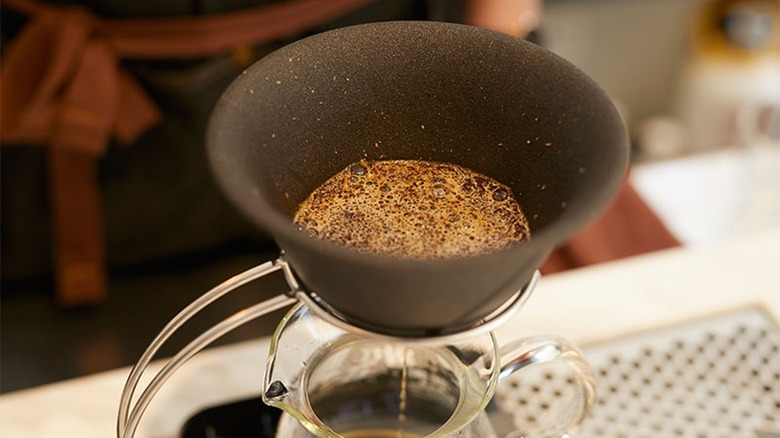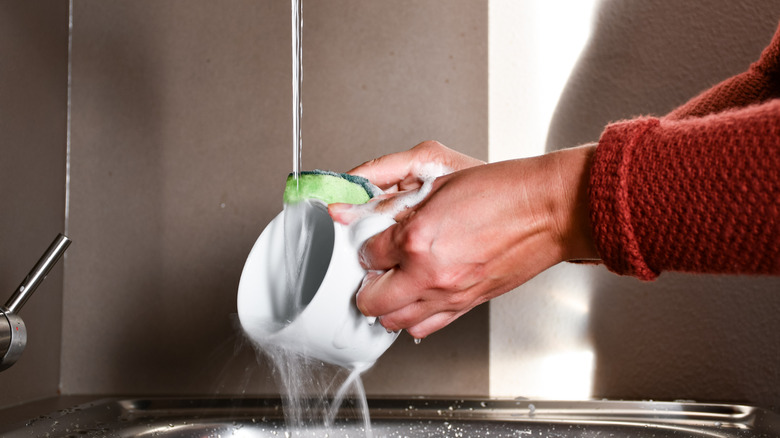Are Ceramic Coffee Filters Really More Eco-Friendly Than Paper Ones?
From glass storage jars to washable zip-top bags, reusable and low-waste kitchen products are gaining popularity as climate-friendly options. However, many popular coffee-brewing methods, from the ubiquitous drip coffee machine to the iconic specialty Chemex pour-over, rely on paper filters that cannot be reused. Manufacturers of Japanese ceramic coffee filters claim that their reusable products are a greener solution, but are they?
The bowl-shaped ceramic filter is made from a porous material that allows water and oils to flow through while trapping the coffee grounds. Kyuemon pioneered their version in the 1980s. This small Japanese brand is based in the town of Arita, which has been celebrated for its porcelain pottery for over four centuries. Until a Canadian distributor brought them to North America in 2016, however, ceramic filters were difficult to find internationally; before they arrived in the Western hemisphere, Coffee Talk called them "one of Japan's best-kept secrets."
These ceramic filters, unlike single-use paper filters, can be cleaned and reused over and over again. It's easy to automatically equate reusability with sustainability and eco-friendliness, but does that assumption hold up with ceramic filters?
Ceramic filters require a lot of water and energy to clean
While the ceramic filter is porous, it is unlike other common kitchen mesh strainers in that you cannot simply run water through it upside-down to clean it out, as specialty coffee expert James Hoffmann notes in a YouTube review. Instead, the ceramic filter must be rinsed out from the inside to remove the coffee grounds and oils, which, Hoffmann says, takes a tremendous amount of hot water.
As Hoffman and multiple Reddit commenters noted, the filter clogs easily if it's used with finer-ground beans, and in general, cleaning it out is an energy-intensive process (both in terms of the energy the owner puts into the process and the water and electricity required). The manufacturer of the LOCA line of filters, for example, recommends either boiling it for 10 to 20 minutes or placing it over a gas flame for several minutes to scorch off any remaining coffee grounds.
In addition to the energy required to keep water boiling — or burn away coffee remnants — water waste is a significant environmental concern in the U.S.
Water and energy waste trump paper waste
In 2014, a U.S. government report found that 40 out of 50 states would see water shortages over the following 10 years, and the situation is already particularly dire near the West Coast. In the summer of 2021, for the first time, the federal government declared official water shortages along the Colorado River (via The New York Times), which 1 in 8 Americans rely on for fresh water, and in Lake Mead, the reservoir formed by the Hoover Dam that provides hydroelectric power for over 1 million people in the region.
According to ProPublica, a significant majority of water in this region goes toward agriculture, meaning that a reformation of business practices could have a more significant effect than individual household habits; nevertheless, the copious amounts of clean water used to wash out ceramic filters would be better used as drinking water, or conserved altogether.
The environmental impact offset by reusable ceramic filters becomes even more questionable when you consider that, although paper coffee filters must be disposed of after each use, the filters — and the used coffee grounds themselves — are compostable. In addition to providing nitrogen to the soil, coffee grounds can keep compost at a higher temperature, which can help repel pathogens. And the paper filters provide an important source of "brown" material, which supports the microbes that break down the organic "green" material. Therefore, especially if you compost (but even if you don't), paper filters could be a more eco-friendly coffee brewing method than ceramic filters.


